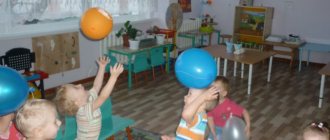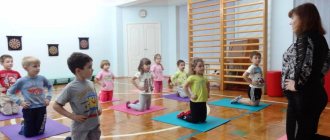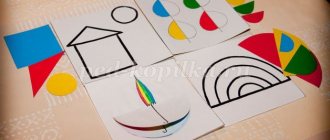Didactic games for speech development in the younger group
The use of play methods in kindergarten is an effective means for developing speech in children. An important role in this process is played by didactic games. Their main task and goal is to train auditory attention, speech apparatus, memory, enrich vocabulary and teach correct pronunciation.
Educational games in kindergarten
Didactic games that kindergartens use in their practice for the second youngest age group are conventionally divided into the following types:
- playing with things (toys, musical instruments);
- board games that use pre-prepared cards with pictures;
- improving the pronunciation of words and sounds.
Note! Currently, there are methodological recommendations from the Federal State Educational Standard that define basic programs, requirements and approaches to drawing up didactic game plans for different age groups of preschool educational institutions.
Didactic games for speech development in the 2nd junior group are primarily aimed at developing in children the correct pronunciation of words and sounds.
Game "Sun or Rain"
During classes you must follow certain rules:
- didactic material must be prepared in advance;
- the clarity of didactic material must be understandable;
- It is advisable to conduct games in a full group so that everyone learns the material evenly;
- classes are conducted according to a pre-drawn plan;
- for outdoor games, you need to organize a safe area to avoid injuries;
- Before you start, you should tell about the rules of the game, interest and attract attention.
Note! For didactic games, a special card index is used. With its help, the teacher systematizes the game material, formulates the goal and tasks that need to be completed during the game.
Games for developing speech for children 3 - 4 years old.
Educational language games for children 3-4 years old are an important element in the development of the child as a whole. Every mother strives to give her child the best from a very early age. However, due attention should be paid to the child’s speech and diction.
Every year the child becomes more mature and each time he needs new information. In order to properly develop a child’s speech, it is not at all necessary to attend various paid classes; you can teach your child to speak clearly and clearly in the form of a game at home.
Believe me, these simple home games are much more effective than lessons with a teacher. Of course, this is the case if there are no violations in pronunciation.
In addition, such games will not seriously save the family budget, but the child will be satisfied with the cozy atmosphere at home and is ready to learn with renewed vigor.
At the age of 3-4 years, the child should happily accept various new games and happily satisfy the various requests of the parents.
This article presents games that will help children 3-4 years old develop speech and diction.
“Go! No, go"
This game evokes a storm of emotions in children; its essence lies in the correct pronunciation of the word “go”. You will need: a car with a body, a small toy.
A car drives up with a rabbit sitting in it and says: we need to load firewood in the forest, the child must pretend that he loaded it and say: “Here, go ahead!” If you make a mistake, correct it and play again.
"Shop"
This game is loved by many girls, because, as a rule, girls love everything related to shopping and shopping. Your task is to build an impromptu store and put goods on the shelves in it.
Let your child be the seller and you the buyer. The most important condition is that the product is sold only if the word is pronounced correctly and the product is guessed and only one sound is pronounced.
For example: I need “m”, the child must look at the product on the shelves and guess that it is a typewriter.
"Simple riddles"
There is nothing complicated in such a game, you need to guess the riddle from everything that can lead you to the correct answer.
For example: lying in the bathtub, when water gets into it, foam forms and your hands become cleaner. The correct answer is soap.
We lie on it whenever we get tired, and in the morning we can’t be torn away. The correct answer is pillow.
"Human"
You will need pencils and a piece of paper. Ask your child to draw a person or characters and come up with their first and last name.
Also let me imagine and draw what kind of house this person has, what kind of pet he has, his workplace.
When he arrives at the workplace, ask him to design his character's clothes, dishes and toys. Finally, ask your child to tell you more about their character based on their drawing. This game perfectly develops memory and imagination.
“Describe the toy”
You will need any toy that is in the house, let the child carefully examine it and hide it.
Let me describe this in as much detail as possible, now attach a badge or rubber band to the same toy and show it to the child again, asking the question “what has changed about it.” He must remember the shape of the toy in order to find the difference. This game is great for developing memory and attention.
"Ring"
You will need a mobile phone and an imaginary interlocutor. Let the child call (grandfather, grandmother, sister or friend) and talk to him about different topics.
At the same time, follow his conversation; he must say goodbye before starting the conversation, and also say “thank you” and “goodbye.”
Also ask the child to tell the other person how he spent his day today and what he was doing. With the help of such a game, you can perfectly establish etiquette standards in your child and develop speech.
"Antonym"
With this game you will introduce your child to antonyms and improve his language skills. You must name a couple of words, and the child must prove the opposite.
For example: the card is white, and the child must answer - the card is black or the tree is tall - no, short.
“What is he like?”
You will need some object or toy, whatever, and the child must describe it in detail. For example: there is a machine, what is it? – red, fast, with black wheels, etc. Here’s a marker, what is it? – green, bright, etc.
You can also switch roles, you can describe a product or item and the child must guess it. For example: red, airy, round - this is a ball.
Language development games for children aged 3 to 4 years will help expand their vocabulary. This kind of game can be played even when you go to the market or store, I show him any product on the shelves and let him describe it in as much detail as possible.
Distance education
Planning work on ZKR in the junior group
- Main areas of work:
- Formation of correct pronunciation
- Development of auditory perception, phonemic hearing
- Development of prolonged oral exhalation, speech breathing
- Work on intonation expressiveness of speech (voice height and strength, word stress, diction development)
- Development of fine motor skills
- Recommendations for planning work on ZKR:
- As an element of speech development in educational areas, it is carried out 2 times a week
- In the calendar plan, work on the development of the respiratory system (breathing, auditory attention, intonation) is taken into account daily
- Fine motor skills are also developed daily
- Individual work must be reflected in planning
- Planning for working with sounds:
Didactic games and exercises:
- Games for the formation of correct pronunciation of sounds - 7c, pp. 54-95, speech therapy lotto, dominoes,
- “Magic cubes” (for onomatopoeia and articulation),
- “Magic bag”, “Sound clock”, “Fishing” (7d, p. 28),
- "Logical Train"
- “Who will pack their things faster?” (7d, p. 49),
- “Pick up a bouquet” (7d, p.52),
- “Find a Pair” (7d, p.53), “Shop” (7d, p.50),
- “Train” (7d, p. 61),
- “Find a place for the picture” (7d, p.29),
- “Magic Wand” (7l, p.24),
- “Whose story is better?” (7c, p.99),
- “Let's go for a ride in the car” (7b, p.27),
- “Name the products” (76, p. 141),
- “Guess the last word” (addition of poems, phrases - 7e p. 59),
- “Who will see more?” (finding words with a given sound in the picture),
- “Who is more faithful and faster?” (you can work similarly with any sounds) (7e, p.30),
- “Who will remember more?” (selection of any words - all parts of speech - with a given sound),
- “Who will hear more?” (selecting words with a given sound from a listened text), making sentences based on plot pictures, stories based on a series of pictures, staging fairy tales.
- Games and play exercises used to develop general speech skills:
- Development of auditory attention , speech and phonemic hearing:
It is necessary to have sounding toys and music in the group. instruments (hammers, bells, metallophone, tambourine, pipes, drum, rattles...) Work on reproducing a series of sounds. Practice the ability to reproduce a series of sounds at different tempos.
Didactic games for the development of auditory attention:
- “Repeat after me” (“Parrot”, “Tape recorder”),
- “Seller and buyer” (7d, p. 16),
- “Telephone” (7 l, pp. 89,94), “Who heard what?” (7g, p.15,16),
- “Who called?” (7g, p.22),
- “Where does it sound?” (7g, from 15),
- “Blind Man’s Bluff” (with sounding objects, with a voice - 7g, p. 18),
- "Whose voice?" (birds and animals - 7g, p. 21),
- “Who hears better?” (7 l., p. 89), “Echo” (7 l., p. 89),
- “Commotion”, “Wind and Birds”, (“Sun and Rain” - 7g, p. 19,20),
- “Snail” (7d, p.22),
- “Frog” (7d, p.22),
- “Find the mistake” (7b, p.25), poems, fables...
Didactic games for the development of phonemic hearing:
- “What sound does your name begin with?”
- “Find the mistake and say the word correctly” (76, p. 151),
- “Rhymes” (desktop-printed and oral version), “Damaged phone”, “Highlight with your voice” (the child pronounces a word with the voice highlighting a given sound - xxtail, mehhh,...) + d/i from point No. 3
- Development of the articulatory apparatus:
At this age, articulatory gymnastics is very effective! It is recommended to include 1-2 minute articulatory exercises daily at any routine moments: after exercise, after sleep, as pauses for rest.
Required:
- cards of games and exercises for articulatory gymnastics (7c p. 32-39, 7e, 7d, 7m p. 125)
- fairy tales about the “Merry Tongue” (7l pp. 31,53,79,111; 7d;…)
- material containing a description of the structure of the organs of articulation when pronouncing the sounds being studied (7i, 7e)
- Development of long exhalation, speech breathing:
The group should have games and play material for the development of long-term smooth exhalation (tissue paper aids, leaves, snowflakes, pendant toys, pinwheels, light blowing toys, inflatable toys, balloons, soap bubbles, pieces of cotton wool, pipes,...) It is necessary to make a card index of games and breathing exercises.
Didactic games for developing long exhalation:
- "Footballers"
- “Whose snowflake... will fly next?” (7g, p.40),
- “Pump”, “Lumberjacks”, “Whose steamboat hums better?” (7g, p. 40), “
- “Recognize by smell” (any aromas - 7g, p. 40),
- “King of the Winds”, “Gurgling” (blowing into water through a straw), “Who is stronger?” (to blow off a light scarf... - 7 l, p87),
- "Bubble." (differentiation S - Ш - 7g, p. 42),
- “Blizzard” (“Beep” - 7g, p. 51)
Didactic games for the development of speech breathing:
- “Come up with a phrase” (7d, e.44),
- “Name your neighbors” (7d, p.44),
- “Echo” (repeat the phrase in 3-5 words),
- “The Magic Mirror” (7d, p.45),
- “Locate the place of the toy” (7d, p.49),
- "Who will win?" (7d, p.52)
- Work on the expressiveness of speech: (tempo, rhythm, verbal and logical stress, diction...):
Practicing the pronunciation of tongue twisters, tongue twisters, poems (choose words with a complex syllable structure).
Dramatization games: “Three Bears”, “Wolf and Seven Little Goats”, “Bear and Christmas Tree” - 7v pp. 53,54).
Round dance games, role-playing games: “Guests”, “Bus”, “Mail”, “Telephone”,…. “Say a phrase with ... mood”, “Isolate a word in a phrase with your voice”, “Your mood”, “Cat and mice” (children are forced to speak slowly), “Blizzard” (7d, p. 51), “Dashes” (7c .51), “Guess which train” (7b p.36)
- Development of fine motor skills:
The group must have:
- card index of finger games, speech with movement
- various mosaics with small details, construction sets, large beads, ...
- aids for fastening buttons, lacing
- tutorials for shading, stencils, labyrinths, stamps, “Lay out a pattern from sticks”
Didactic games for the development of fine motor skills:
- "Piano",
- "Magic bag"
- “Find a pair” (buttons or other paired small items),
- “Dry finger pool” (7i, p. 74),
- “Clothespins” (7i, p.67),
- “Make a chain (paper clips)”, “Finger theatre”, “Shadow theatre”, “Forfeits”, “Drawing with scissors” (7i, pp. 69,75),
- “Embroiderers” (7i, p. 70),
- “Find a surprise” (7i, p.66),
- “The Little Pharmacist” (7i, p.69),
- “Colored drops” (7i, p. 68), “Wind up a ball”, “Motley rug”
- Organization of the ZKR corner:
- For the corner it is necessary to allocate a specific place where the following should be collected:
- systematized speech and visual material
- card files of games and exercises. for the development of fine motor skills
- card files of games and exercises. on the development of breathing
- card files of articulation exercises
- card files of games and exercises. on the development of breathing
- card files of games and exercises. on the development of auditory and speech attention
- card file of speech material for working with studied sounds
- Material for the development of fine motor skills should be accessible to children (except for very small parts)
- The corner is replenished monthly:
- speech and visual material according to planning
- material for the development of general speech skills and fine motor skills according to these recommendations at the discretion of the teacher
- any training session for working with sounds (one) and for developing general speech skills (one)
- Recommended reading:
- A. Efimenkova L.I. “Speech Formation in Preschool Children”
- b. Maksakov A.I. “Is your child speaking correctly?”
- V. Maksakov A.I., Tumakova G.A. "Learn by playing"
- Ed. Seliverstov V.I. “Games in speech therapy work with children”
- D. Shvaiko G.S. “Games and play exercises for speech development”
- E. Aksenova A.K., Yakubovskaya E.V. “D/i in Russian language lessons in grades 1-4. aux. school."
- and. “Tru-la-la” from the series “Karapuz”
- h. Budennaya T.V. “Speech therapy gymnastics”
- And. Galanov A.S. “Mental and physical development of a child from 3 to 5 years old”
- K. Borodich A.M. “Methods for the development of children’s speech”
- l. Khvattsev M.E. “Speech therapy work with preschool children”
- m. Ed. Ushakova O.S. “Speech development classes in the Danish garden”
- n. Gerbova V.V. “Classes on speech development in the senior group”
Speech therapist teacher
E. S. Mikushina , highest qualification category
| Methodical piggy bank |




